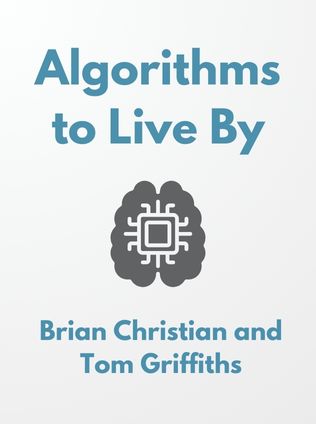
Algorithms to Live By
The Computer Science of Human Decisions
By Brian Christian and Tom Griffiths
Published 04/2016
About the Author
Brian Christian is an acclaimed author and scientist known for his work at the intersection of computer science and philosophy. His previous books have explored the ways in which human and machine learning intersect, and his writing often delves into the ethical and philosophical implications of technology. Tom Griffiths is a professor of psychology and cognitive science, with a deep interest in how humans and computers solve problems. Together, they bring a unique combination of expertise to "Algorithms to Live By: The Computer Science of Human Decisions," where they explore how algorithms, commonly used in computer science, can be applied to everyday human decision-making.
Christian’s background in the humanities and Griffiths’ scientific approach provide a balanced perspective on the topics discussed in the book. Their collaboration bridges the gap between abstract computational theories and practical applications, making complex algorithms accessible and relevant to a wide audience. The book has been praised for its ability to take technical concepts and present them in a way that is both engaging and insightful, offering readers tools to improve their lives through better decision-making and problem-solving strategies.
Main Idea
"Algorithms to Live By: The Computer Science of Human Decisions" presents the idea that many of the challenges we face in life—such as making decisions, organizing our time, and solving problems—can be effectively addressed using algorithms from computer science. The authors argue that by understanding and applying these algorithms, we can optimize our lives, making better decisions, managing our resources more efficiently, and ultimately leading more fulfilling lives. The book serves as a practical guide that translates complex computational theories into strategies that can be used to tackle everyday problems, from the mundane to the profound.
At the heart of the book is the notion that both humans and computers face similar challenges in resource management. Just as computers use algorithms to process tasks efficiently, humans can use similar strategies to optimize their time, attention, and decision-making processes. Christian and Griffiths introduce readers to a range of algorithms, each designed to address a specific type of problem, and show how these can be adapted to real-world situations.
Table of Contents
- Introduction to Algorithms in Everyday Life
- Decision-Making Algorithms
- Organizational Algorithms
- Problem-Solving Algorithms
- Miscellaneous Algorithms
Introduction to Algorithms in Everyday Life
The book opens with a thought-provoking exploration of how algorithms, often associated with computer science, can be applied to everyday life. Christian and Griffiths argue that many of the problems we face—whether deciding on a career move, organizing our schedule, or even managing relationships—can be approached more effectively by using the same strategies that computers use to solve complex problems. This concept challenges the traditional view that algorithms are only useful in highly technical fields, demonstrating instead that they have practical applications in a wide range of real-world scenarios.
One of the key ideas presented is that both humans and computers are constrained by limited resources—time, attention, and energy, in the case of humans; and processing power and memory, in the case of computers. By understanding how computers manage these constraints through algorithms, we can learn to make better use of our own limited resources. The authors introduce the concept of "computational thinking," a mindset that involves breaking down complex problems into manageable parts and applying systematic approaches to solve them.
"Computers can process tasks with blinding efficiency, and by utilizing the same strategies, so can we." - Brian Christian and Tom Griffiths
This foundational idea sets the stage for the rest of the book, where Christian and Griffiths delve into specific algorithms and how they can be applied to various aspects of life. They emphasize that algorithms are not just abstract mathematical formulas but practical tools that can enhance our decision-making, improve our organization, and help us solve problems more effectively.
Decision-Making Algorithms
The first category of algorithms discussed in the book focuses on decision-making. Christian and Griffiths introduce several key algorithms designed to help people make better choices, particularly in situations where the future is uncertain or where there is incomplete information. These algorithms address common life decisions such as when to settle for an option and how to optimize various aspects of life.
Optimal Stopping: How to Know When to Settle
One of the most intriguing algorithms discussed is the optimal stopping algorithm, which addresses the problem of knowing when to stop exploring options and commit to a choice. This algorithm is particularly useful in situations where you face a series of choices, such as searching for a new job, apartment hunting, or even dating. The optimal strategy, as suggested by the authors, involves spending the first 37% of your search time exploring options without making a commitment. After this exploration phase, you should then choose the next option that is better than any of the previous ones you’ve encountered.
Sign up for FREE and get access to 1,400+ books summaries.
You May Also Like
The Subtle Art of Not Giving a F*ck
A Counterintuitive Approach to Living a Good Life
By Mark MansonRich Dad Poor Dad
What the Rich Teach Their Kids About Money - That the Poor and Middle Class Do Not!
By Robert T. KiyosakiHow To Win Friends and Influence People
The All-Time Classic Manual Of People Skills
By Dale CarnegieFreakonomics
A Rogue Economist Explores the Hidden Side of Everything
By Steven D. Levitt and Stephen J. Dubner



















